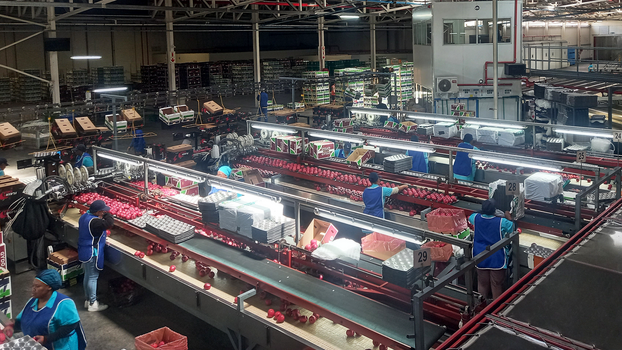
As many as 757 million people are suffering from chronic hunger, according to the United Nations Food and Agriculture Organization. Almost 30 percent of the world’s population — 2.22 billion — are grappling with medium to severe levels of food insecurity, and around 2.8 billion people lack the money to afford a healthy diet. In many poor countries in the Global South, up to 70 percent of the population are affected. Many are starving because they are too poor to put enough food on their table, even though in reality there is enough to feed everyone.
Jan Urhahn is director of the Rosa Luxemburg Foundation’s Food Sovereignty Programme, which is based at our Johannesburg office.
The causes of hunger are complex and manifold. Much has to do with power imbalances, crippling poverty, state budgets burdened by debt, and massive inequality in terms of access to arable land, water, and seeds. Yet the global food crisis should be understood as part of a wider polycrisis in which the impacts of climate change and the COVID-19 pandemic are interwoven with and mutually reinforce the repercussions of economic and debt crises, as well as wars and conflicts. This manifested itself in the form of the global food price crisis of 2020–2023, which fuelled profit-driven inflation. Hedging and speculation exacerbated the situation, driving already soaring food prices even higher.
Grain markets are seeing a strong push towards concentration, which is another factor impacting price trends. Five agricultural companies, also referred to as the ABCCDs (Archer Daniels, Bunge, COFCO, Cargill, and Louis Dreyfuss), control between 70 and 90 percent of the global grain trade and thus play a crucial role in shaping prices. In 2022, their profits tripled compared to the 2016–2020 period; their net earnings for that year amounted to more than 17 billion US dollars.
The financialization of markets for essential staple foods must be stopped.
Since the COVID-19 pandemic it has become evident that price peaks for raw materials, energy, and transport trigger price surges as downstream businesses attempt to sustain their profit margins. It is this phenomenon, known to economists as “seller’s inflation”, that transforms local shocks into a general inflation, which is largely driven by corporate profits. According to the European Central Bank, rising corporate profits accounted for almost 50 percent of prices increases for consumers in 2022–2023.
Food Price Inflation at a Peak
Food price inflation in low-income countries is significantly higher than in medium- and high-income countries. On average, food price inflation in low-income countries reached around 30 percent in 2023, with the global average reaching 6.5 percent. Conditions throughout countries in the Global South vary substantially. For the 2022–2023 period, annual food price inflation in Zimbabwe soared to 285 percent, making it the world’s most heavily affected country. Inflation peaked at 158 percent in Venezuela and 143 percent in Lebanon. In Sudan, inflation swelled to more than 60 percent, while other countries including Egypt, Haiti, Cuba, and Malawi grappled with a rate of 30 percent or more.
Inflation diminishes a population’s real income and thus exacerbates social inequality. Every percentage point that drives up food prices pushes 10 million people into extreme poverty. In 2022 and 2023, the financial toll on low-income households was twice to three times as severe as for high-income households. In 2022, the poorest 20 percent of the population in the US spent 31.2 percent of their income on food. For the wealthiest 20 percent, that figure was merely 8 percent. In Germany as well, low-income households are particularly vulnerable to inflation, spending 23 percent of their income on food. Meanwhile, the national average is 11 percent. This demonstrates that sharp rises in food prices are a direct driver of the upward redistribution of wealth.
Need for Stricter Regulation
The reality is that food systems are incredibly vulnerable to crises, and food prices can fluctuate wildly. This can have devastating effects and must be subject to strict oversight. Governments worldwide must do more to stabilize food prices and prevent massive price spikes. The creation of national, regional, and global public buffer stocks for food can help to stabilize prices on global agricultural markets and limit inflation, argue Merle Schulken and renowned economist Isabella Weber in a study published in June 2024 that was commissioned by the Rosa Luxemburg Foundation, the Heinrich-Böll-Stiftung, and TMG Research. What is more, buffer stocks ensure the availability of staple foods and minimize the risk of scarcity. Buffer stocks set up for the purpose of increasing food security are able to absorb short-term fluctuations in price and supply — both for producers and consumers — and cushion price peaks.
A further problem is the widespread lack of transparency when it comes to pricing and the distribution of profits. The establishment of price monitoring centres at the national and regional level could allow for a breakdown of net margins according to brand and producer. This data, if shared with potential public buffer stocks for food, could then be used to curb price volatility. Price monitoring centres could also, for instance, enforce a ban preventing the purchase of products at below their cost of production, thus following Spain’s lead, where such legislation was passed in 2021. This could be a way to penalize food retailers who resort to price dumping practices in order to boost their profit margins.
Large players that dominate certain sectors along the entire supply chain must be reined in through stricter antitrust legislation and broader political support for its implementation.
For such a ban to be effective, non-compliance with legal requirements will have to be properly sanctioned. Such a mechanism would in turn allow farmers to sell their products at better prices while shielding consumers against extreme price spikes. To prevent the latter, instruments need to be created that set food price ceilings and ensure that people can afford adequate amounts of food. As long as corporations continue to rake in excess profits, these should be taxed and reallocated to fund programmes that promote the positive transformation of our food systems.
In addition to these measures, the financialization of markets for essential staple foods — meaning the transformation of arable land and agricultural commodities into capital investments, as well as speculation with these commodities — must be stopped. This step should include setting stricter position limits on commodity futures markets — in other words, on the number of futures contracts that a trader or investor is allowed to hold and trade at any given moment. Actors without ties to the agricultural sector, such as pension funds or pure investment funds, should be banned from trading on commodity futures markets. Trade in agricultural commodities must be subject to greater transparency in order to limit the informational leverage held by players including the five largest agricultural trading companies, the ABCCDs. The same goes for the power they wield in terms of shaping financial transactions on commodity futures markets, as well as other transactions including physical trade in agricultural commodities. For this to happen, it must be made mandatory for states and businesses to publish and share information regarding their stocks.
Large players that dominate certain sectors along the entire supply chain must be reined in through stricter antitrust legislation and broader political support for its implementation. In order to put an end to the further formation of monopolies and oligopolies, hurdles for the unbundling of companies independent of abuse must be lowered further and the existing legal framework should be used for this purpose.
Translated by Lyam Bittar and Louise Pain for Gegensatz Translation Collective.
